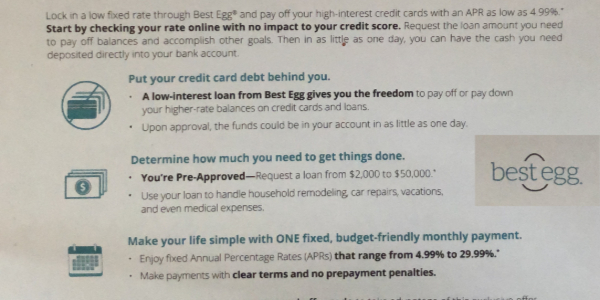Home /
Money Blog
The Devil is in the Details
Note: You can use any financial calculator to do this problem, but if you want the BEST, you can
get our
10bii
Financial Calculator for iOS, Android, Mac, and Windows!

Photo by Kyle Humfeld
THE SCENARIO
As happens with some regularity, I got a mailer from a company called 'Best Egg' this week, offering to lend me money. How lucky! The mailer touts this as a 'debt-consolidation' loan, with rates ranging from 4.99% to 29.99%*, depending on my creditworthiness (you'd think they'd have some idea of that before sending me such an offer).
Moreover, they charge you an origination fee of 0.99% to 5.99%, which is
deducted from the amount they give you. This means that if you borrow $10,000 and they charge you a 5.99% origination fee, they're only handing over $9,401, but you're paying interest on the full $10,000.
I know what you're thinking: this sounds awesome! Where do I sign up?
The question: If I were to borrow $10,000 from Best Egg for 10 years**, how much more would I pay overall if my loan were at 29.99% versus 4.99%? Assume monthly payments.
* If I were to consolidate debt to a 29.99% rate, that would probably be worsening my financial position - there
might be credit cards out there with 30%+ rates, but I don't have any of them.
** They don't disclose the maximum length of time you can borrow money from them in the mailer, but they do mention that loans with terms of 5 years or longer will have
at least a 4.99% origination fee, so I'm guessing that 10 years is an option.
THE SOLUTION
This one is pretty straightforward, and has a few parts:
- Find the total payments at 29.99%
- Find the total payments at 4.99%
- Find the difference
First things first, make sure the calculator is using 12 Payments per Year.
Part 1: The 29.99% Loan
N: 120 (The loan term is 10 years, which is 10 x 12 = 120 months)
I/YR: 29.99 (The loan's interest rate is 29.99%)
PV: 10,000 (Best Egg is lending me $10,000)
PMT: (This is what I'm trying to find)
FV: 0 (At the end, the loan is paid in full)
The monthly payment of
$263.54, multiplied by the 120 months I have to make that payment, is the total amount I pay on the loan.
The total amount I pay for the $10,000 Best Egg lends me is $263.54 x 120 = $31,625.29.
Part 2: The 4.99% Loan
N: 120 (The loan term is 10 years, which is 10 x 12 = 120 months)
I/YR: 4.99 (The loan's interest rate is 4.99%)
PV: 10,000 (Best Egg is lending me $10,000)
PMT: (This is what I'm trying to find)
FV: 0 (At the end, the loan is paid in full)
The monthly payment of
$106.02, multiplied by the 120 months I have to make that payment, is the total amount I pay on the loan.
The total amount I pay for the $10,000 Best Egg lends me is $106.02 x 120 = $12,722.00.
Part 3: The Difference
If I borrow at 29.99% instead of 4.99%, I pay a total of $31,625.29 - $12,722.00 =
$18,903.29 more for the $10,000 I borrowed (of which I only
received $9,400).
You may be wondering 'what about the origination fee?' Good question. The origination fee doesn't change the math by which I determine the monthly payment (or the total amount paid). The only thing it does is reduce the amount of money Best Egg gives me at the beginning - I still have to pay the whole loan balance.
I pay around 2½ times as much over the life of the loan if I borrow at 29.99% instead of 4.99%, and I pay around 8 times as much interest.
Clearly the details matter!
What do you think? Would you borrow money at 29.99%? What about 10%? What about 5%? What leads you to make that statement? Let us know in the comments!
 Photo by Kyle Humfeld
Photo by Kyle Humfeld